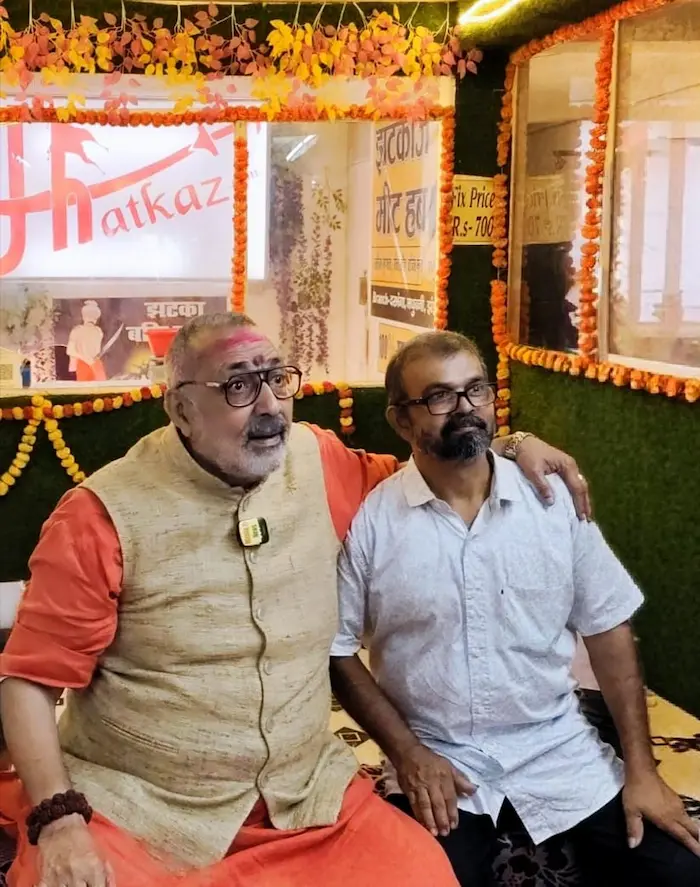
Giriraj Singh’s call to reject halal meat and embrace jhatka sparks political firestorm
The Statement That Stirred Controversy
Giriraj Singh’s Jhatka vs Halal Remark Sparks Heated Debate – Union Minister Giriraj Singh has once again found himself at the center of a political storm. During a visit to a meat shop named Jhatkaz in Madhubani, Bihar, on August 30, 2025, Singh urged Hindus to “eat only jhatka meat and avoid halal”, claiming the practice is deeply rooted in Sanatan Dharma. His comments quickly went viral, triggering sharp reactions from political opponents, religious groups, and social media users.
Singh praised Muslims for their commitment to halal dietary laws and religious discipline, contrasting it with what he described as a lack of unity among Hindus. He said, “Muslims live and die by their faith. Hindus must also follow their traditions, including food habits, to protect Sanatan Dharma”.
This isn’t the first time Singh has made such remarks. In the past, he has written to Bihar’s Chief Minister demanding a ban on halal-certified products, calling it “treason” in a secular democracy.
What Is Jhatka and Halal Meat?
To understand the debate, it’s important to know the difference between jhatka and halal meat:
- Jhatka: The animal is killed instantly with a single blow, believed to cause less suffering and align with Hindu rituals like bali pratha (sacrificial offerings).
- Halal: The animal is slaughtered slowly by cutting the throat while reciting a prayer. Blood is drained completely, and the process is considered spiritually clean in Islam.
Supporters of jhatka argue that it’s more humane and traditional in Hindu culture. Halal, on the other hand, is mandatory for Muslims and dominates India’s meat export market, especially to West Asia.
Singh’s remarks have reignited old debates about religious identity, food politics, and cultural preservation.
Political Reactions: Support, Criticism, and Condemnation
Opposition parties were quick to respond. The Rashtriya Janata Dal (RJD) accused Singh of ignoring his ministerial duties and focusing on divisive issues. RJD spokesperson Ejaz Ahmad said, “He talks about food habits, not employment or development. His textile ministry has done nothing for Bihar”.
Samajwadi Party (SP) chief Akhilesh Yadav also condemned Singh, saying, “Those responsible for weaving the fabric are busy tearing it apart. He can’t manage tariffs in his own ministry but lectures the nation on meat”.
Many citizens expressed concern over the minister’s remarks, arguing that food choices are personal and protected under the Indian Constitution. Others supported Singh’s call, saying it’s time Hindus reconnect with their traditions.
The debate has spilled onto social media, with hashtags like #JhatkaVsHalal and #SanatanDharma trending across platforms.
Beyond Meat: What This Debate Really Means
At its core, this controversy isn’t just about meat, it’s about identity, tradition, and political messaging. Singh’s remarks reflect a growing trend of leaders invoking religious customs to shape public behavior and political narratives.
Supporters see it as a call to cultural revival, while critics warn of sectarianism and distraction from real governance issues. The conversation also raises questions about:
- Freedom of choice vs religious conformity
- Role of ministers in shaping lifestyle debates
- Impact on communal harmony and food businesses
As India continues to navigate its diverse religious landscape, such statements can either foster pride or provoke division, depending on how they’re framed and received.
Conclusion:
Giriraj Singh’s jhatka vs halal remark has sparked a fiery debate that goes far beyond dietary preferences. It touches on faith, politics, and the evolving role of tradition in modern India. Whether seen as a cultural call or a political provocation, the conversation around food and faith is far from over.
Also read – Hate Bounty Sparks Outrage: Mumbai Erupts as BJP MLA Remarks Shake Secular India
Stay informed with the latest news and updates – only on Rapido Updates.